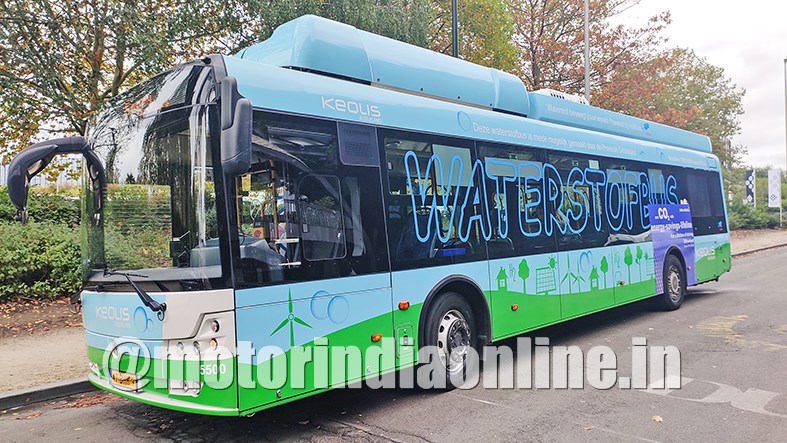Netherlands-based company presented its ‘ZETT-BUS’ 12m city bus powered by fuel cells at Busworld Europe 2019.
Zero-emission public transportation doesn’t necessarily have to expensive and difficult a transition for operators but is pretty much effortless to achievable, says ZETT – an innovative company that leases hydrogen fuel cell buses for city operators. It claims that hydrogen is the easier and low-cost solution for zero-emission, which can be efficiently produced from renewable energy sources and can also be easily stored and transported in a less-expensive way, unlike electricity. Refuelling of buses does not take longer than filling up diesel buses, it adds.
The company demonstrated its 12-metre low-floor city bus ‘ZETT-BUS’ powered by hydrogen fuel cell system for the visitors of the bus expo. Its average hydrogen consumption is 6.8 kgs per 100 kms, while the bus boasts a running range of 550 kms with full tank of fuel. The ‘HyMove’ fuel cells system generates electricity to power the BMZ-supplied battery system and ultimately the axle-mounted electric motors sourced from Ziehl-Abegg. ZETT guarantees the hydrogen bus performance to be equal or better than conventional buses, along with lowest TCO per kilometre over a lifespan of 10 years or 1,200,000 kms.
Says Frank Ex, Founder – ZETT: “There is a misconception prevailing on the efficiency of hydrogen fuel vehicles, as against battery vehicles. We are working behind the possibilities of hydrogen for over a decade, what we have realised is that integrating the entire value chain of production of hydrogen, buses and maintenance creates a feasible business case. It will be easier for the operators to transition to cleaner transportation this way”. That way, his company is leasing fuel cell buses for a fixed cost per ‘zero-emission kilometers’, which includes fuel, financing and depreciation, maintenance, replacement costs and so on.
Won’t refueling be a challenge owing to lack of hydrogen fuel stations? Frank Ex says that this limitation is taken care by high capacity fuel tanks (sourced from Worthington Industries) that offer longer range. “ZETT builds and maintains hydrogen filling stations, along with operational support. The provision of a tank installation is always included in the lease rate”. The bus is in daily operation for Keolis (a public transporter in Netherland) since 2017, and the operators find it absolutely reliable as any diesel bus, he adds.
The bus chassis and body works are done at Poland, while the fuel cell-electric drivetrain is manufactured and installed in Netherlands. ZETT claims that a new fuel cell bus is being developed in parallel to the current design, along with an 18-metre variant. First deliveries of the bus will be in the third quarter of 2020, as per the company’s plans.
